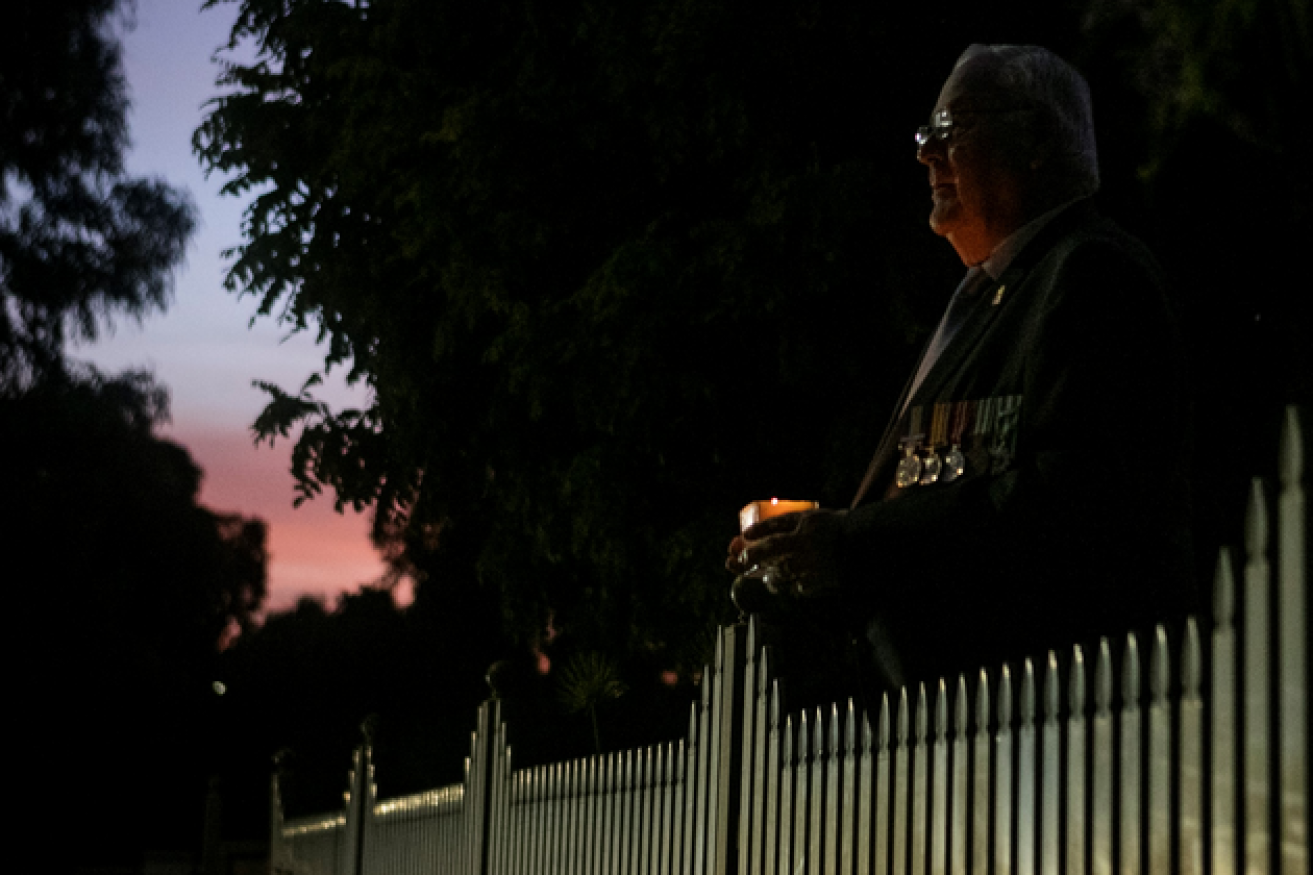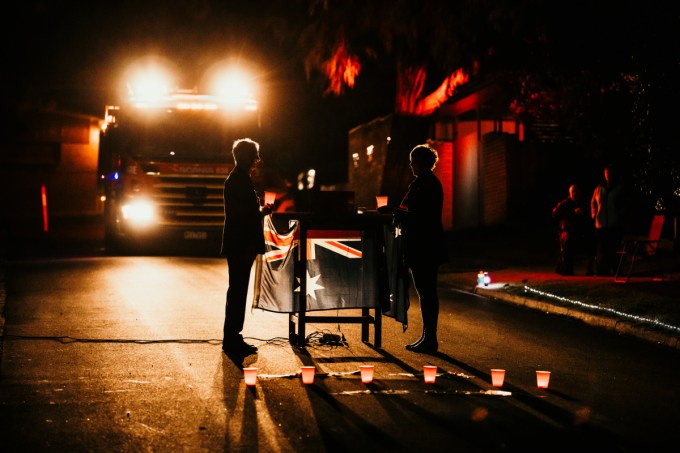Amid the lockdown and COVID-19’s chaos, Australians mark Anzac Day as never before


Candle in hand, a serviceman marks Anzac Day in silence and locked-down isolation by his front fence. Rhoto: RSL
Australians have marked a solemn Anzac Day in solitude, lighting up the pre-dawn darkness from their houses in what Scott Morrison described as a “small, quiet and homely” occasion.
In driveways, beside front fences, on apartment balconies and in living rooms, Australians in isolation gave silent thanks to the men and women who sacrificed so much more.
Wearing bathrobes and pyjama socks and clutching leashes with dogs, they emerged from lockdown to bow their heads in respect to the diggers past and present who they could not see.
Candles flickered in the hands of old soldiers – too frail to be exposed to the public – the medals on their chests catching the first light of the sacred day.
Beside them, younger Australians raised in the freedom secured by Anzac Day’s heroes echoed the words “lest we forget”.
A different but still poignant ANZAC day commemoration.#LestWeForget pic.twitter.com/uSkzDGE9dJ
— Oscar (@Oscarthefarmer) April 24, 2020
One hundred years have passed since then Prime Minister Billy Hughes declared April 25 as Anzac Day, locking into the calendar a formal celebration of the Diggers who gave their all in far off fields.
The foe then had been Kaiser Bill’s Germany.
Today, it is an unseen but far more insidious enemy – the COVID-19 virus.
It is only the third time that marches have been cancelled – the last time in 1942 and previously during the devastating Spanish flu outbreak.
Yet although stores are shuttered, jobs vanishing and the economy is in a tailspin, the fears and concerns for what lies ahead were set aside in the early morning gloom as a nation rose from their beds to do right by those who never came home.
https://twitter.com/WilliamsAlden/status/1253771215795179521
Instead of the customary dawn gathering of veterans and their families outside the Australian War Memorial in Canberra, the national commemorative service was off-limits to the public, instead broadcast by the ABC from 5.30am.
That service began with the ethereal pulse of a didgeridoo played by Seaman Lynton Robbins and included an address from Prime Minister Scott Morrison.
Mr Morrison explained the importance of marking from home “our most sacred day”.

Tyson Matheson and wife Theresa remember the fallen from their home in Mildura.
He drew on the words of his wartime predecessor John Curtin while addressing a crowd-free commemorative service inside the Australian War Memorial in Canberra.
“Here in Canberra, on this day, 75 years ago and the midst of war, our then Prime Minister John Curtin, called for every citizen to give equal measure of devotion, what our servicemen and women give every day,” Mr Morrison said.
“He reminded Australia that the original Anzacs handed on a torch, clenched and carried high, and that is passed on to every generation of Australians.
“This Anzac Day, it’s been passed to us. And so together, with faith in each other, and guided by the lives and examples of those who’ve gone before, we grasp that torch and we raise it high again lighting up the Anzac dawn. Lest we forget.”

Prime Minister Scott Morrison and wife Jenny lay a wreath at the Tomb of the Unknown Australian Soldier. Photo: AAP
Mr Morrison delivered his speech alongside the roll of honour, which marks the names of 102,000 men and women who have died in service.
“Through these 102,000 men and women, and the millions more who’ve worn our nation’s uniform, we come to understand what love of family, community and country truly means,” Mr Morrison said.
In Europe, where so much Australian blood was mingled with the mud of the Western Front, the stirring bugle call of the Last Post did not sound at Australian war memorials.
Nor was there a dawn service at Gallipoli, where the legend began, or at Villers-Bretonneux in northern France or in London.
But Australians in the Antarctic – which is free from coronavirus – came together in the morning cold to pay their respects.
The icy continent is the only one without COVID-19, meaning services could take place in a more traditional manner.
There are 89 expeditioners who are hunkering down for the winter at Australia’s four research stations, Mawson, Davis, Casey and on sub-Antarctic Macquarie Island.
Australia’s High Commissioner in London, George Brandis, and acting New Zealand High Commissioner David Evans will lead a special commemoration service to be streamed from their respective homes from 11am local time.
Mr Brandis says Australians and New Zealanders will remember the fallen in a very different way than what they’re accustomed to.
“This year the crowds solemnly gathering at dawn services and cheering along parade routes are replaced by countless acts of quiet, solitary remembrance,” he told AAP in a statement.
















